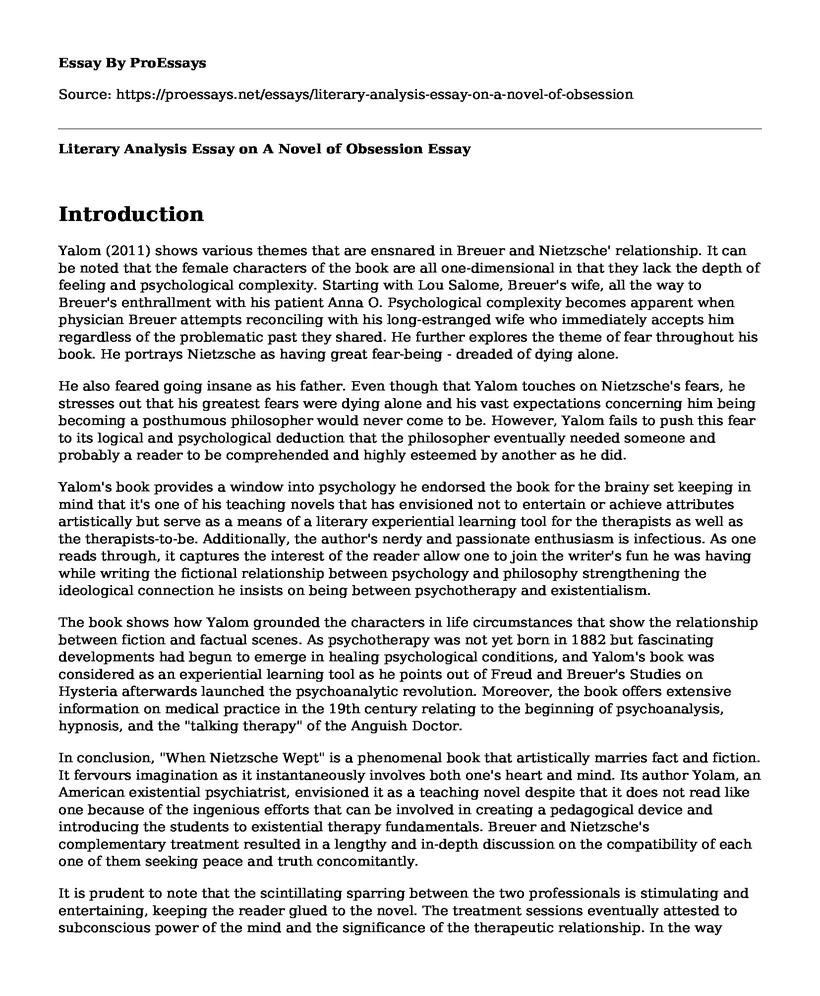Introduction
Yalom (2011) shows various themes that are ensnared in Breuer and Nietzsche' relationship. It can be noted that the female characters of the book are all one-dimensional in that they lack the depth of feeling and psychological complexity. Starting with Lou Salome, Breuer's wife, all the way to Breuer's enthrallment with his patient Anna O. Psychological complexity becomes apparent when physician Breuer attempts reconciling with his long-estranged wife who immediately accepts him regardless of the problematic past they shared. He further explores the theme of fear throughout his book. He portrays Nietzsche as having great fear-being - dreaded of dying alone.
He also feared going insane as his father. Even though that Yalom touches on Nietzsche's fears, he stresses out that his greatest fears were dying alone and his vast expectations concerning him being becoming a posthumous philosopher would never come to be. However, Yalom fails to push this fear to its logical and psychological deduction that the philosopher eventually needed someone and probably a reader to be comprehended and highly esteemed by another as he did.
Yalom's book provides a window into psychology he endorsed the book for the brainy set keeping in mind that it's one of his teaching novels that has envisioned not to entertain or achieve attributes artistically but serve as a means of a literary experiential learning tool for the therapists as well as the therapists-to-be. Additionally, the author's nerdy and passionate enthusiasm is infectious. As one reads through, it captures the interest of the reader allow one to join the writer's fun he was having while writing the fictional relationship between psychology and philosophy strengthening the ideological connection he insists on being between psychotherapy and existentialism.
The book shows how Yalom grounded the characters in life circumstances that show the relationship between fiction and factual scenes. As psychotherapy was not yet born in 1882 but fascinating developments had begun to emerge in healing psychological conditions, and Yalom's book was considered as an experiential learning tool as he points out of Freud and Breuer's Studies on Hysteria afterwards launched the psychoanalytic revolution. Moreover, the book offers extensive information on medical practice in the 19th century relating to the beginning of psychoanalysis, hypnosis, and the "talking therapy" of the Anguish Doctor.
In conclusion, "When Nietzsche Wept" is a phenomenal book that artistically marries fact and fiction. It fervours imagination as it instantaneously involves both one's heart and mind. Its author Yolam, an American existential psychiatrist, envisioned it as a teaching novel despite that it does not read like one because of the ingenious efforts that can be involved in creating a pedagogical device and introducing the students to existential therapy fundamentals. Breuer and Nietzsche's complementary treatment resulted in a lengthy and in-depth discussion on the compatibility of each one of them seeking peace and truth concomitantly.
It is prudent to note that the scintillating sparring between the two professionals is stimulating and entertaining, keeping the reader glued to the novel. The treatment sessions eventually attested to subconscious power of the mind and the significance of the therapeutic relationship. In the way Yalom portrays Nietzsche as being afraid since the idea of dying terrified him. In my opinion, I found the situation very hard to imagine and relate, as am puzzle as to why someone would believe that his father's fate will catch up to him. It also evident that Nietzsche requires the views, but in this case, the readers to familiarize and highly recognize another the same way he was with himself. Besides these beliefs and criticism portrayed in the novel which fashions the novel in a more unique manner, the book represents diverse characters which are found around our community. The novel has also proven to be beneficial to those specialized in the fields of philosophy and psychology.
Reference
Yalom, I. (2011). A Novel of Obsession. Harper, New York.
Cite this page
Literary Analysis Essay on A Novel of Obsession. (2023, Jun 08). Retrieved from https://proessays.net/essays/literary-analysis-essay-on-a-novel-of-obsession
If you are the original author of this essay and no longer wish to have it published on the ProEssays website, please click below to request its removal:
- Personal Perception of Doctor Victor Frankenstein
- To Room Nineteen and Pride and Prejudice Passage Analysis Essay
- Philosophy Response: Brave New World
- Creativity and Rationality in Charlotte Gilman's The Yellow Wallpaper
- A Macao Narrative Book Review Paper Example
- Machiavelli's 'The Prince' - Essay Sample
- Joy Harjo: A Poet of Nature, Grit, and Grief - Essay Sample







